What’s in a girls’ toilet at a rural school?

Three years ago, an experimental toilet was built for girls at a rural school in Jhalakathi district. While the original idea was to address typical social and hygiene-related problems of young girls coming into puberty, we also felt that a gender-friendly toilet would improve the self-confidence and self-esteem of girls and benefit them in many ways. Moreover, the project was intended to "change the attitudes of schoolteachers, parents, local community leaders, and even adolescent boys" in the area/school.
Soon after the toilet's construction, the Covid-19 pandemic spread ominously and a follow-up to observe the changes brought about by our project was shelved. Assessing its impact was revived again in 2022 as schools were fully reopened after nearly two years' hiatus.
The toilet has two washrooms surrounded by an outer room with running water. Sanitary pads, soap, and liquid handwash are available in the outer room. The girls can change pads when needed and drop the used one in a bin using a poly bag. In addition, there is a whiteboard where the girls can write the date of their period. The two toilets placed in an inner room provide privacy and safety from prying eyes.
Here, we report what impact the toilet has had on the girl students themselves. On the basis of qualitative interviews with the girls of Classes VII-X on their school premises using a structured guide, we assess whether and how the availability of the specially built toilet affected their attendance and attention in school, their mental and physical well-being, and the challenges they face during their monthly cycle. The following thematic issues emerged.
Silence broken
One of the girls said in the past that discussions on menstruation were considered taboo or shameful at the school. Neither the guardians nor the teachers felt comfortable discussing the issue openly. The girls were even unwilling to carry a pad in their bags; instead, they opted to stay at home during their periods. After the construction of the toilet, female teachers briefed them on the uses of the facility. Hygiene has now become a familiar subject in the school. Girl students feel at-ease discussing the problem with other female students irrespective of their senior or junior status. Guardians have also become more open to the matter. Thus, an inhibiting topic has become a familiar subject of discussion in the school.
Odour problems gone
The schoolgirls indicated that, in the past, they were hesitant to use the school toilet as it was rather unclean and a foul odour was a constant presence. Faulty construction and inadequacy of running water, in addition to the unavailability of toilet paper, were major problems. Besides, they also had to wait in a queue sometimes as the number of washrooms was inadequate. This was a privacy issue for many. Moreover, there was no sanitary pad dispenser or a basket where they could dispose of the used pads. The existing facility addresses all these issues, providing a hygienic and healthy internal environment.
Release from period phobia
One of the girls said, "One day, I was feeling pain in my abdomen and after going to the toilet I found that my period had started. I was at a loss and decided to go home." Some girls mentioned being unable to remember exactly when their period would start; it may not begin as scheduled. Timing could also vary from one month to another, and the process could start abruptly. As a result, they suffered from anxiety. Remembering to carry their own sanitary napkins was also stressful. However, now they have little worry as sanitary pads are readily available in the new facility and they do not need to go home or stop going to school. They can also write down their period dates on the board in the toilet, making their school attendance convenient.
Improved school attendance, concentration on studies
In the past, the girls related experiences of uneasiness for the entire day for lack of a proper toilet. The situation worsened if they experienced unexpected periods, when they became unmindful and could not concentrate on their studies. Besides, they were unable to attend school regularly. In some cases, they stopped going to school for days. Missing classes impacted their education adversely. Now, they no longer miss school and go home at the normal time, even if their periods commence abruptly.
Increased use of sanitary pads
In the past, the girls used rags and other unhygienic solutions instead of sanitary pads. There was a likelihood of infection if the rags were not clean. Moreover, they could not change them once they came to school. Now, they get a pad free of cost from the school. This has made their life easy, they opined.
Sense of privacy and security increased
Privacy is an important issue for female students when attending school together with male students. Being able to dispose of their used pads discreetly is a great relief now, in addition to having access to soap and other basic toiletries to refresh themselves. They also feel at ease as the bathroom is located at a distance from the boys' toilet. Moreover, if there is any problem in the toilet, the authority takes necessary measures to fix it. It was a real big change for them, said one girl. They opined that the newly built toilet gave them a sense of privacy and confidence to attend school.
Mental peace and happiness
They used to have anxiety and a feeling of shame concerning periods in the past. Now, they have a clean and comfortable place with running water. They feel physically fresh and mentally happy now. One of the girls said, "We can change our pads when needed. Our life has become much better than before."
Conclusion
A simple, functional, box-in-box toilet can bring about dramatic change in the lives of young girls aspiring to lead better lives. That this basic matter continues to be ignored in schools across Bangladesh speaks about the status of women in this day and age and the patriarchal attitudes and sense of priorities that continue to dominate civic life in the country. It is time for policy intervention to construct girl-friendly toilets in all secondary schools across the country as more young women step forward and take charge of their lives.
Dr Syed Saad Andaleeb is distinguished professor emeritus at Pennsylvania State University in the US, former faculty member of the IBA, Dhaka University, and former vice-chancellor of Brac University.
Dr M Ibrahim Khalil is assistant professor at the Department of Sociology of Govt BM College in Barishal.

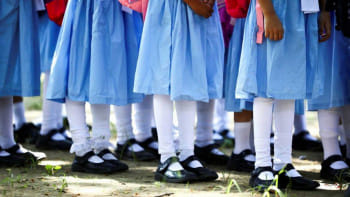
 For all latest news, follow The Daily Star's Google News channel.
For all latest news, follow The Daily Star's Google News channel. 
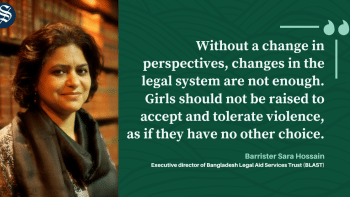

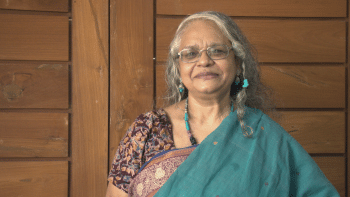



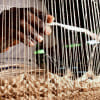
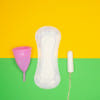




Comments